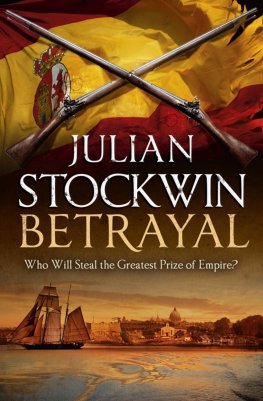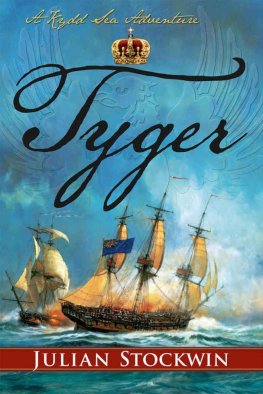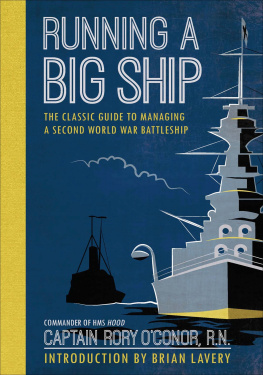
The first book in the Thomas Kydd series, 2001
Aft the more honour
Forward the better man
HORATIO NELSON
The Honorable the Member for Molton. The Speaker of the Commons, in his full-bottomed wig, gave the floor to Edmund Burke in the crowded chamber.
Rubbing his long nose, the orator stood and glanced across to the opposite benches at the slumped figure of the Prime Minister, Pitt the Younger, who seemed resigned to events. It would not do, however, to underestimate Pitt, even if, as a man of peace, he seemed unsure of his direction in this new war with the French.
Burke drew himself up and spoke effortlessly above the disorderly hum. Is this House aware that at this very moment, in a time of crisis without parallel in the history of these islands, His Majestys government sees fit to let its chief means of defense, the Navy, its sure shield he paused and looked impressively about him -rot at anchor in its ports, while the enemy is at liberty to issue forth on his awful missions of destruction? He was aware that behind him, ready for any excuse to interject, was the fat, mustard-waistcoated figure of Charles Fox. Discredited for his earlier support of the French Revolution, he was nevertheless leader of His Majestys loyal opposition and a liability.
No doubt the Honorable Gentleman is sensible of the fact that our most valuable possessions in the Caribbean lie trembling in daily expectation of a descent by the enemy? That the City clamors for protection for its commerce? That we, the loyal Whigs he ignored the raucous splutter behind him that could only have issued from the embittered Fox -demand as conditional to our continued support to this Ministry that measures be taken to protect our commercial interests. And strong measures, which are swift, effective and decisive!
Pitt slouched farther down in his seat. What did they know of the real situation? Admiral Howe with the Channel Fleet was in port, true, but he commanded the only strategic fleet Britain possessed at this time, and would answer to the nation for its preservation until it was fit enough to grapple with the enemy. Howe would not jeopardize its safety. Still watching Burke, he leaned over to the man on his left and whispered, Desire the Admiralty to make a showing off the French coast just two or three ships of force will suffice. That would be enough to mollify Burke, who had only spoken to point up his own grand gesture of conciliation. Howe could spare two or three of the more elderly vessels. Allow that it is a matter of some urgency, Pitt added wearily.
From the quarterdeck of the ship-of-the-line Duke William, nothing could be seen of the passengers in the ugly little hoy thrashing its way through the gray-green seas toward them. It was making heavy weather of it, bluff bows slamming into the short, steep waves kicked up by the stiff northerly. Drenching sheets of spray were flung skywards before whipping aft over the small craft.
Duke Williams officer of the watch lowered his telescope with a grunt of exasperation. It was important to know quickly the results of their swift press-gang raid inland. Duke William had to be in a position to catch the evening tide to enable them to reach Admiral Howes fleet at Spithead before it sailed.
With a new captain and a hard horse first lieutenant, the old ship had a poor reputation and would never attract volunteers. Furthermore, this was a full five days after the declaration of war against revolutionary France, and the Impress Service and individual press-gangs had between them cleared the Thames of seamen.
From his own pocket, Captain Caldwell had paid the hire of a pair of coaches to take a press-gang in a lightning swoop down the Portsmouth road, hoping to pounce on seamen who had taken refuge in the country or, failing that, seize some sturdy rural lads. An illegal act, but they could be spirited away well before magistrate or sheriff could intervene, and once at sea they were beyond reach.
The hoy drove on, its single-reefed mainsail board taut, its angle to the tide-driven waves resulting in an awkward screwing motion. Sprawled miserably on the bottom boards under a tarpaulin were some thirty wretched, seasick men and boys, the press-gang harvest.
Taking an appreciative pull from a bottle, the petty officer in charge returned it to his shipmate and wiped his mouth on the back of his sleeve. Get it inside yer, Davey, while yerve still got the chance, mate.
The two men crouched in the lee of the weather gunwale, knowing they were out of sight from the ship. It would be their last chance before arriving aboard out in the great Fleet anchorage of the Nore.
Spray rattled again on the sail, and a thin, cold rain drifted across them. As the petty officer hunkered down farther, his black hat wet and gleaming, his shoe caught a lump in the tarpaulin, bringing a muffled cry. He lifted the edge, and a dark-haired young man of about twenty stared up at him with dull brown eyes. The petty officer grinned and dropped the tarpaulin.
The young man tried to ease his position, but it was hopeless: confined as he was by other wet bodies, seasickness and the continual violent motion of the hoy, he lacked strength to move. Nearby, a pale flaccid face lifted. The empty eyes looked into his and as he watched, a weak spasm produced from slack lips a green ooze that tracked across the sunken cheeks. The sight brought on the inevitable, but there was no more of his meager breakfast to bring up. Subsiding weakly after a series of dry heaves, Thomas Paine Kydd laid his head once more on the wet, hard boards.
Only a few nights earlier, he had been enjoying warmth and companionship in the Horse and Groom in Merrow village, a public house that dated back to the first King Charles; its age and solidity spoke of the bucolic calm of that part of England. Three miles up the road was Guildford, a popular staging halt on the way from London to the trading ports of the south and west. There, in the last days of the peace, he had seen from his wig shop in High Street grim faces of naval officers staring from coach windows as they clattered over the cobblestones on their way to the Angel posting house.
He had heard in the shop that this war was going to be quite different from the stately clashes of empires earlier in the century. It was not going to be a traditional war against France. Instead, it would be a fight to the death against the howling mob that had overwhelmed all the forces of the state and had now put to death their own king. In the Horse and Groom there had been bold talk that night, and this time not only from Stallard and his crew, as usual ensconced in secret conclave in the snug. It was widely held that the midnight rides of Captain Swing and a rash of rick-burnings were the work of Stallard and his men, and Kydd tried to avoid their company.
The loss of the American colonies and the fall of Lord North, spectacular victories in India and the rise of the younger Pitt had not disturbed this quiet corner of England, so it had been all the more shocking when a wider world had come smashing in on the night the press-gang had made its move. Tipped off by a sheriffs man who wanted to rid himself of undesirables, they had sprung their trap with practiced ease.
One minute it was noise and laughter, the next an appalled silence in the smoke-filled taproom at the sight of sailors appearing at every exit. They were in a costume like those to be seen in the theater, complete with pigtails, black tarred hat and short blue jacket. And each had a cudgel in one hand, which he tapped slowly in the opposite palm.
Next page







